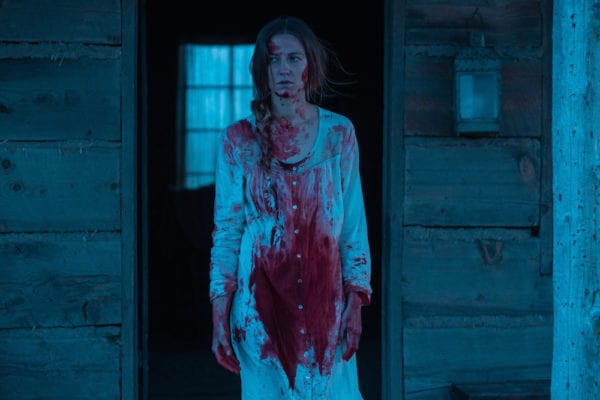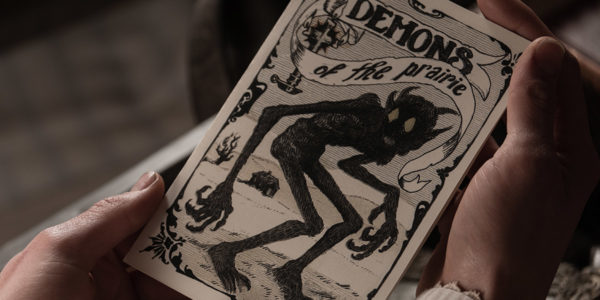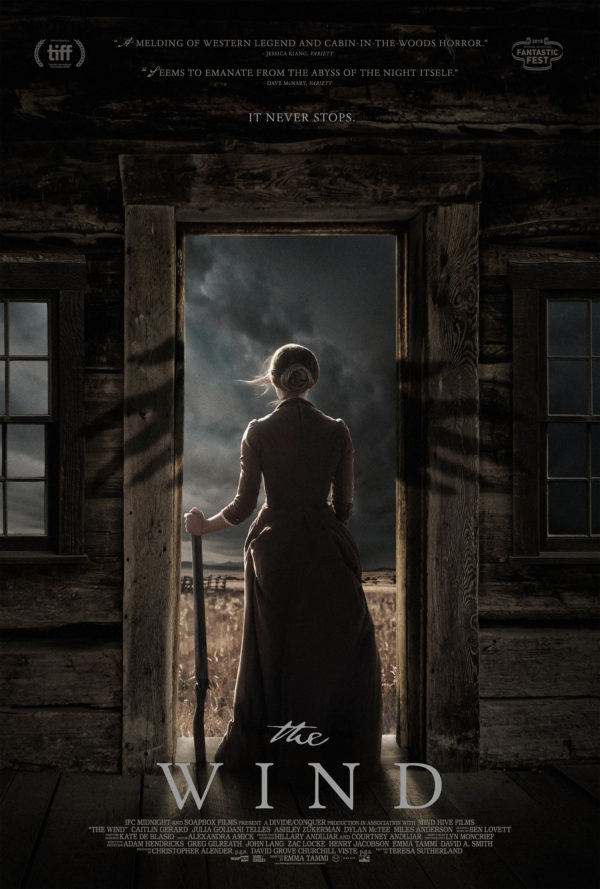The Wind. 2019.
Directed by Emma Tammi.
Starring Caitlin Gerard, Julia Goldani Telles, Dylan McTee, Martin C Patterson, and Ashley Zukerman.
SYNOPSIS:
A plains-woman faces the harshness and isolation of the untamed land in the Western frontier of the late 1800s.

Even if The Wind isn’t a stealth sequel to 90s trashterpiece Demon Wind – much to this garbage connoisseur’s disappointment – filmmaker Emma Tammi makes her mark on grief-stricken period paranoia through fierce understatement. Shades of The Babadook, The Witch, and The Golem swirl infinite prairie doggin’ isolation. Writer Teresa Sutherland forces her characters to dwell on psychological torture by circumstance alone, given how civilization escapes the landscape in all directions. As day morphs into night, vile spirits appear with ambiguous representation given the film’s stance on vague linear developments. Timelines splice, facts jumble, and reality remains in question – a dream slow-burn to some, but (not so good) nightmare to others.
Caitlin Gerard stars as frontierswoman Lizzy Macklin. She tends a desolate plot of land with husband Isaac (Ashley Zukerman). When neighbors Emma (Julia Goldani Telles) and Gideon Harper (Dylan McTee) stake adjacent property in the distance, the couples become quick friends on geography alone. Emma soon finds herself pregnant, and visions of a creature (that Lizzy also combats) send the stressed future mother into hysterical fits. Blame her “Demons Of The Prairie” book, blame early rural America’s lack of population, but each night, Lizzy sleeps with a rifle in hand. Waiting, praying the wind blows past without incident.
For Lizzy, escape is not an option. 1800s lifestyles haven’t the technology or opportunity to know anything more than survival. Isaac’s duties are to provide manual labor, keep fingernails dirty from usage, and present archetypal male status. Lizzy cooks for Isaac, cleans for Isaac, and most importantly *relies* on Isaac (bygone gender roles). As Emma launches one of her boogeyman rants, Lizzy hushes the housewife and urges to keep talk pleasant around their men as an act of submissive pleasing. Lizzy only has herself to rely on not only because Isaac’s trips to town may take days, but because her “insanity” must stay secret. Not to upset Isaac or cause confrontation.
It’s the kind of imprisonment by culture only our ancestors will deal with, and as does The Witch – another faith-based attack against conscious rationale – The Wind exists, and excels, living in its uninhabited world. Signatures of the past become haunts of the present as Lizzy fends off feral wolves, cowers as misty fogs seep through wooden door planks, and must squint to glimpse a house lamp lit by either Harper. Fears of the unknown clash with vivid imaginations, further failed by solitary living and paranormal blueprints indiscernible from chance. Windows explode into glass shards, visits from passers-by become threatening advances when eyes cloud tar-black, and snarling shadowy shapes take shape from behind the flicker of heating fires. Tammi needn’t make a monster, but instead, weaponize the daily routines of settlers – specifically women.

Cinematographer Lyn Moncrief works around minimalist production design inside modest pioneer cabins and outdoor stretches of open land by framing every shot with explicit mood. As the camera slowly approaches a door just flung open, centered and inching closer, outlined hands creep towards the screen with menace. Daytime meetups under crooked tree branches so brightly sunkissed, while later darkness surrounds with a thickly blanketed effect. The Wind is gorgeously shot and staged despite being a barebones ghost story, which may be Tammi’s greatest asset when healthily nurturing tension. Equally scripted but less visual watches lose interest thanks to on-screen dullness – which Moncrief combats.
Caitlin Gerard’s portrayal of a woman in repressed distress is what attunes The Wind to a level of horror with more under the hood than bumps after midnight. While the script’s flighty and inexplicable nature doesn’t always play nice, Gerard is a pictorial representation of the unbelieved. She begs and pleads, goes batty, tries to warn those around her, but only Emma aligns. Gender politics underscore a lurking apparition as Gerard wads frustration, despair, and recurring pregnancy trauma into a crumpled main character who’s (rightfully) convinced she’s her only savior. Supporting characters are defined by their interactions with Lizzy – Emma the confidant, Isaac the breadwinner, Gideon the, well, useless putz – not by mistake.
The Wind gets caught up in gusty narrative freedoms that sometimes blow in circles, but that’s not to say hair-raising chills escape circulation. Emma Tammi’s Western horror tale unloads a six-shooter full of dread and peppers around the bullseye at worst. More about the horrors of nature and man than cloven beast, brooding about as tumbleweed psychological madness overtakes. At a brisk and breezy sub-90-minutes, Tammi gets away with replacing all the colors of her wind with raven-clawed blackness. Not exactly the most vicious genre take, but certainly unique and worth some hair-trigger screams.
Flickering Myth Rating – Film: ★ ★ ★ ★ / Movie: ★ ★ ★
Matt spends his after-work hours posting nonsense on the internet instead of sleeping like a normal human. He seems like a pretty cool guy, but don’t feed him after midnight just to be safe (beers are allowed/encouraged). Follow him on Twitter/Instagram/Letterboxd (@DoNatoBomb).











